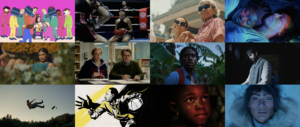Solar Momas
Kathy A. McDonald
Documentaries tell us both who we are and what we could be. By spotlighting challenging issues, documentaries can also be instigators of social change. The subjects of these films are often pioneering social entrepreneurs—enterprising idealists who dedicate themselves to affecting positive social change.
Stories of Change: Social Entrepreneurship in Focus Through Documentary is a five-year long special initiative resulting from a collaboration between Sundance Institute’s Documentary Film Program and the Skoll Foundation. This unique partnership has brought together like-minded filmmakers and social entrepreneurs to explore and expose some of today’s most challenging global issues, from access to healthcare and education, to food security and energy in rural communities to providing real-world job skills to urban youth.
At the core of the initiative is a tangible objective to supply filmmakers with the resources to document meaningful efforts by social entrepreneurs and to bring added exposure to the projects (and the social justice issues therein) through effective outreach and ancillary media developed concurrently throughout production. Via this collaboration, the change makers will not only inspire audiences but also be inspired themselves to innovate further.
Beginning in 2007, the Skoll Foundation, together with the Sundance Documentary Film Program, began to explore the potential of bringing together Sundance filmmakers and social entrepreneurs. “There’s an incredible power the two groups could bring to each other’s work,” contends Sandy Herz the Skoll Foundation’s Director of Strategic Alliances. “Social entrepreneurs’ efforts are made more effective by the connection with filmmakers and master storytellers, and filmmakers have more impact because of this access to experts and innovators on the ground,” she says.
Although the Skoll Foundation is the major backer, the films are not commissioned works — Filmmakers retain editorial control. Furthermore, almost all of the projects have attracted additional funding sources, advises Cara Mertes, Director of the Sundance Documentary Film Program. “This goes beyond creating a film for them,” Mertes explains. “It becomes how story and narrative can work within their culture and organization,” she says of the original approach.
The relationship works both ways. “The whole idea of bringing the two groups together, is that we will get stories that resonate with global populations,” says Mertes. The urgency of solving these large-scale problems necessitates “powerful storytelling in the service of change makers,” believes Mertes.
The Sundance Documentary Film Program, which administers Stories of Change, selected 10 projects in 2001 from more than 300 submissions. The partnership launched with two distinct threads: a series of convenings intended to facilitate interaction and engagement between filmmakers and social entrepreneurs and a fund for the resulting documentary film projects between these two groups. “We’ve found our social entrepreneurs are engaged in storytelling and walk away with much clearer ideas on how to tell their story in order to move people to action,” says Herz. At the same time, filmmakers are able to advance the issues they care about most.
“Generally you don’t have time to think about outreach until a film is done,” explains director Kief Davidson. (His previous documentary Kassim the Dream, the story of a former child soldier turned boxing champ, was a winner of numerous festival prizes and distributed theatrically by IFC Films). Davidson and his producer Cori Stern are in the midst of production on the Untitled Global Public Health Documentary, a multi-faceted profile of Partners in Health, one of the world’s most innovative health care organizations.
“The film is jut one piece of a bigger grassroots campaign which we will construct in production and post,” Davidson says. He finds, “the challenge now becomes creating specific goals for an impact campaign, and not just showing what the situation is like, but what the average person can do to change things.”
As producer Cori Stern explains, the filmmakers’ intent is to emotionally engage the audience so they will want to participate in facilitating change. This activation involves more than just an end title card that posts a website link. “Sundance and Skoll have encouraged us from the very beginning to really think about how crafting the storytelling can dovetail with the impact goals and how they can inform each other,” says Stern. “What we choose to show is what the audience will be motivated to try to change.”
As Mertes explains, selected projects focus on system transformers, like Dr. Paul Farmer of Partners in Health– innovators who can rethink and reset how and what can be done in their arenas. During the 2012 Sundance Film Festival, a panel scheduled for January 24th will present the Stories of Change initiative and will feature Davidson as well as Solar Mamas’ filmmaker, director Jehane Noujaim (Control Room) and subject, Bunker Roy founder of the Barefoot College. The project comes full circle as Noujaim first met Roy at the 2010 Sundance Festival. Solar Mamas tracks three grandmothers from impoverished rural villages as they are trained at the Barefoot College to solar electrify their villages. This act transforms the life of the village but also the women’s own standings, converting them from marginalized members of society to key resources.
Because film (in the broadest sense of recorded moving images) is embedded in everyone’s day-to-day life through social media, mobile devices and other platforms, it is an increasingly critical and essential medium for information. Stories of Change will continue this tradition with a series multi-platform strategies including games, short films and geo-location apps that push these stories on to multiple screens as well as out into the real world. For instance, an element created during the filming of the The Revolutionary Optimists— the Map Your World app–helps track clean water and previously undocumented neighborhoods.
To date, two feature films have been completed: Gayle Ferraro’s To Catch A Dollar premiered at the 2010 Sundance Film Festival and director Patrick Reed’s The Team premiered at IDFA 2010 and aired on PBS. By the finish of 2013, Mertes expects nine films to be completed, a collection that she hopes will have a shelf life that lasts well into the next decade, as these films bore into the issues of the day and show how social entrepreneurs provide workable solutions to the world’s most complex problems.




